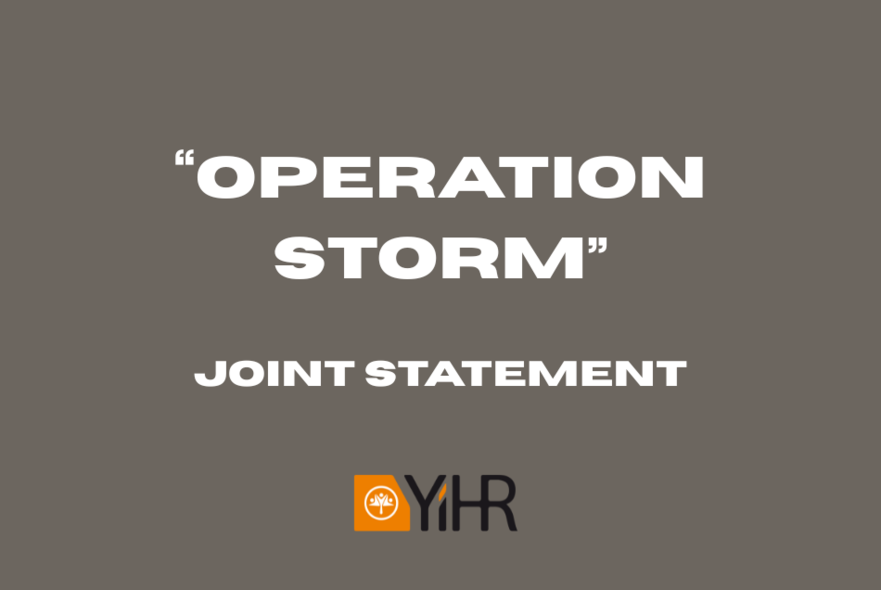Joint Statement of the Youth Initiative for Human Rights from Croatia and Serbia on the occasion of the 30th Anniversary of the Military-Police Operation “Storm”.
The Youth Initiative for Human Rights in Croatia and the Youth Initiative for Human Rights in Serbia believe that the authorities in both countries have used the 30th anniversary of Operation Storm to, each in their own way, demonstrate chauvinism and a complete abandonment of responsibility toward the victims.
In this tone of commemoration, statements by Croatian officials make no mention of the exodus and killings of Serbian civilians, nor the later prevention of their return. Similarly, statements by Serbian officials make no mention of responsibility for the joint criminal enterprise that resulted in the creation of the so-called Republic of Serbian Krajina (RSK), nor of the torture and forced mobilization of Serbian refugees from Croatia.
In Serbia, the anniversary of “Operation Storm” was marked on August 3rd in Sremski Karlovci with a central state commemoration titled “Storm is Pogrom – We Remember Forever,” jointly organized by Serbia and the Bosnian-Herzegovinian entity of Republika Srpska. This commemoration served officials from Belgrade and Banja Luka—Vučić and Dodik—as an opportunity to openly mock the rule of law in light of the final conviction of the President of Republika Srpska. On August 1st of this year, Dodik was sentenced to one year in prison and six years of political activity ban for signing decrees proclaiming laws previously annulled by the High Representative in BiH, Christian Schmidt.
Although President Vučić apologized in his speech to the refugees for the redirection of refugee columns away from major Serbian cities, he did not condemn the ethnic engineering of Milošević’s regime—namely, the deployment of Krajina Serbs to Kosovo—nor the torture and forced mobilization to which displaced people were subjected during the summer of 1995 by the Serbian Ministry of Internal Affairs and paramilitary units. Vučić and Dodik, as proof of an alleged continuous international conspiracy against Serbia and Republika Srpska, spoke affirmatively about the “sacrifice” of convicted war criminals Radovan Karadžić, Ratko Mladić, and Biljana Plavšić.
The 30th anniversary of Operation Storm in Knin was marked by speeches from Prime Minister Plenković and Speaker of Parliament Jandroković, in which they praised the policies of Franjo Tuđman. Following the official speeches, a song by Marko Perković Thompson was played. The Croatian Prime Minister spoke positively about members of the Serbian community in Croatia who were among the defenders, but did not mention the site of Serbian civilian suffering he visited five years ago—such as the village of Varivode. In his speech, Plenković stated that Croatia “enabled the return of Croatian Serbs who wished to return,” referencing one of Tuđman’s speeches—a statement particularly cynical in light of the 2015 International Court of Justice ruling that found Croatia’s top officials had planned Operation Storm—including Tuđman himself—regarding the mass exodus of the Serbian population as desirable.
Speaker Jandroković stated that he was “moved by the number of young people participating in the military parade in Zagreb and at concerts by Marko Perković Thompson,” claiming that these young people “respect our faith and church, our tradition and identity,” and that they had embraced the doctrine of Franjo Tuđman. After such statements by Croatia’s top officials, it is no surprise that there is still no condemnation or prosecution of individuals who, ahead of Perković’s concert in Sinj on August 4th—just as was the case in Zagreb—glorified Ustaša war criminals Jure Francetić and Maks Luburić.
A true signal that the authorities in both countries are moving toward peacebuilding will come when we see a monument erected in Knin to honor Serbian civilians—citizens of the Republic of Croatia—who were killed during and after Operation Storm, and when a street in Belgrade named after war-mongering ideologue Brana Crnčević is renamed in honor of a victim of the Ovčara war crime committed against Croatian civilians and prisoners—Ružica Markobašić. In December 2022, the Initiative in Serbia submitted a request to the Belgrade Commission for Street and Square Naming for this renaming, but we have not received a response to this day.
We remind the public that exactly 15 years ago, the Initiative in Croatia placed a plaque apologizing to the civilian victims of “Operation Storm.” On this 30th anniversary, we openly call on the City of Knin to begin a dialogue on the official installation of such a commemorative tribute to civilian victims. This is our responsibility toward our fellow citizens whose rights were not only unprotected but were violated in our name. Shedding the burden of crimes and responsibility is a debt that all levels of government in the Republic of Croatia owe—not only to the victims of these crimes, but also to those commanders and soldiers who did not violate international law, as well as to young people and future generations.
